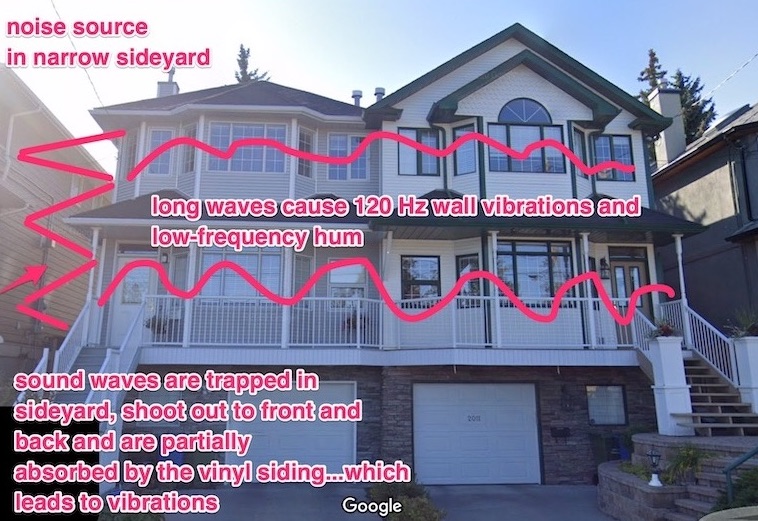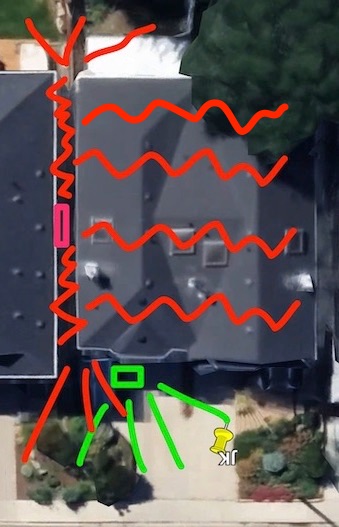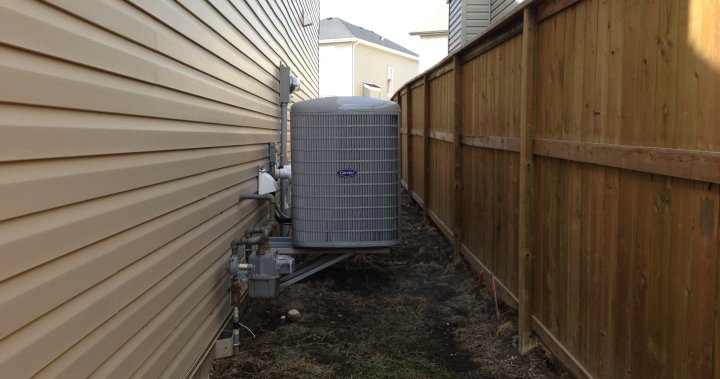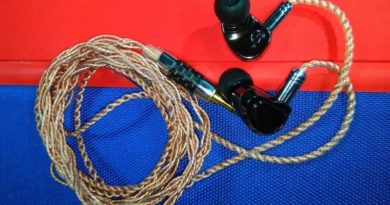Calgary Community Standards Bylaw 32M2023 Failure: Intrusive Air Conditioners And Problematic Neighbours
The Calgary Community Standards Bylaw 32M2023 protects the industry and offenders but not the community from noise and vibrations, not even from sleep deprivation. Example: air conditioners that are poorly placed AND poorly managed without consideration for the neighbours, a common problem in Calgary. The city does little to promote vibrant, liveable, inner-city neighbourhoods with a high quality of life.
In this Article
Disclaimer: location images taken from publicly accessible Google Street View and Google Earth Pro. Last edited 2023-08-20.
Introduction
This rather comprehensive article deals with holes in the Calgary Community Standards Bylaw and the consequences for me and many other victims whose quality of life is adversely affected by inconsiderate neighbours. I have been working on this topic since 2008.
Under the Calgary Community Standards Bylaw, residents have the right to not be disturbed by noise and, therefore, have the responsibility to not make noise that disturbs others. Source: Calgary Bylaws site.
In reality, this is not true. The city allows companies to operate 110 dBC leaf blowers indiscriminately during the 48 hour period following a snowfall, nights included.
Air Conditioners have been a similar, long-standing problem. In 2009, Bill Bruce, then the head of Animals and Bylaws Services, reported 1500 annual AC-related noise complaints to me personally. This number must have increased substantially with the increasingly hotter Calgary summers.
Noisy hot tubs are not far behind in negative popularity.
The Calgary bylaws do not consider AC installation locations and the effects of low-frequency noise.
!
Air Conditioners causing Constant Hum and Vibrations – Example from an Established Neighbourhood.
Here a representative sample of an issue that affects many Calgarians: I have lived in the white, semi-attached house with green trimmings (centre right) for 19 years. Structurally, both attached houses are one unit. While we were out of town recently, the neighbours to the left of this double-dwelling installed an air conditioner in the middle of the narrow, reflective sideyard that is partially covered by the two protruding rooflines.


A narrow sideyard ist the worst possible installation site for neighbours as the operators essentially throw their unwanted “garbage” over the property line, but with a twist.
The AC emits sound pressure that is echoing (technical term “reverberating”) between the walls back and forth, is thereby amplified and shoots out of the front and back of the sideyard.
Sound sample recorded with phone at my patio door (2023-10-01 @ 4°C). Would you like to sit on my deck?
But part of the sound pressure is absorbed by the vinyl siding and causes the neighbouring house walls to vibrate. The more rigid the walls, the lesser the vibrations; stucco is the best reflector with the smallest absorption.
The vibrations travel a long way without much attenuation (because of the long wavelengths of low frequencies) and affect all our walls, including the party wall between the attached dwellings.
The science and its consequences are well established and summarized in this document:
Not Cool: Central Air Conditioner Noise in Calgary’s Narrow Sideyards Background and Solutions
Although there are lots of other ACs running in the neighbourhood, including one in the front yard of the attached dwelling, their sound waves do not invade our house as the waves can freely dissipate towards the street. They also do not reach our backyard.
My very problem is not conventional noise but wall vibrations, something omitted by the bylaws.
“…Council will review how to handle complaints about air conditioners, central vacuum systems and even outdoor hot tubs. The concern is the constant hum or vibration is too annoying and doesn’t fall under existing bylaws. Mayor Naheed Nenshi would like to see air conditions only in backyard and not between homes but that would mean changes to land use bylaws…” GLOBAL NEWS 2013.
The Double Nuisance
The AC nuisance is twofold: installation in the “wrong location” and managing its use without consideration for others. Very common in Calgary. In our case…
1. Poor Air Conditioner Placement (between Homes)
Owing to its installation location in the narrow sideyard between homes, the AC’s sound pressure and the resulting wall vibrations generate a constant hum all over our house, from the basement, the basement bedroom, the main floor (kitchen, living room), through my home office to even our master bedroom. And our backyard sounds like a construction site. There is no escape.
It is not loud inside but static, visceral, repetitive, and simply everywhere and continuous over long periods. And when you are stationary (bed, sofa), this becomes a Tinnitus. It is a constant stress for people susceptible to low-frequency noise.
It has to be noted that the hum does NOT come in through our windows but strictly from our own vibrating walls.
You can recreate this hum by using this online tone generator, pull the slider to 120, and push PLAY:
https://www.szynalski.com/tone-generator/
120 Hz appears to be the natural resonance frequency of my walls. This is so low in the frequency spectrum that it cannot even be covered up by the TV sound (unless you add a subwoofer)…even earplugs are problematic.
Another example of a low-frequency nuisance is that famous Encana hum that travelled for kilometres.

Now try to sleep when it hums and buzzes around your ears in your pillow at night when ambient noise is low. How can anyone take the liberty to impose themselves on others like that? Well, they can, and it happens all over the city.
Constant low-frequency noise, even at low volumes, is a nuisance for many, particularly at night.
2. Poor Air Conditioner Management (vs. Common Courtesy)
Placing an AC unfavourably for the neighbours is one thing, managing it unfavourably is another.
Calgary has a subarctic (mountain) climate (Dfc according to the Köppen-Geiger climate classification) with cool summer nights (8-16°C). My bedroom is located 1110 m above sea level. Is there ever a need for running an AC in the wee morning hours?

Like many other Calgarians, the owners run their AC in overkill mode: they don’t mitigate the heat problem by keeping the sun out using blinds or opening their windows to let a cool breeze in. And they run it even on cool days.
Relying on a thermostat and/or timer, the AC runs even on 12°C evenings (after a 19°C afternoon peak) for hours and also daily in the middle of the night (independent of outside conditions)…which affects our sleep patterns. No attempt is made to be considerate, to conserve energy, or to protect the environment. And they are by far not the only ones.
If you are lucky, your neighbours acknowledge the impact of their AC and are willing to mitigate the problem. If you are unlucky, they put their heads in the sand. Ours are not even talking to us.
The circular argument is: “installation and use are within current bylaws, hence it cannot affect neighbours”.
Unbelievable that neighbours that far away are allowed to affect one’s life this much.
Blast from the Past
We gathered technical knowledge during a two-season abuse from an AC unit formerly in our sideyard back in 2008/2009, installed by a house flipper.
Although this unit was much closer to our walls and much louder than the currently offensive one on the other side, it did not affect the basement bedroom or my back office. Its more aggressive pitch was filtered out by the walls. Only the familiar 120 Hz wall vibrations remained.
Those neighbours switched their AC off at 11 pm nightly to let us sleep in our master bedroom.
Bylaw Services were of no help, but the AC unit disappeared nevertheless when the flipper wanted to sell the house. Our interaction with potential buyers would have made a sale difficult.
Legal Aspects
The Calgary Community Standards Bylaw 32M2023 states…
No Person shall operate or permit to be operated an air conditioner, fan, central vacuum system or generator that causes a Continuous Sound that exceeds the greater of the following Sound Levels:
- (a) 70 decibels (dBC) Leq measured during the Day-time; or
- (b) 60 decibels (dBC) Leq measured during the Night-time;
at any Point of Reception within a Residential Development.
Comment: Air conditioners are rated between 65 dB and 75 dB (manufacturers use A-weightung, not C-weighting, as it does not consider the wall-penetrating low frequencies and produces much smaller numbers). Not having a fixed reference for sound pressure measurements (“at any point of reception”) renders the city’s sound level numbers meaningless.
Essentially all ACs in narrow sideyards would fail these measurements at the property line considering the amplification through ricocheting sound waves. Industry lobby prevents that.
As an educated guess, the neighbours’ AC would clock in at 80-85 dBC at the property line, way above the legal thresholds.
The City of Calgary only considers noise quantity but not noise quality. Even a quietly dripping faucet is excavating over time.
What the Bylaw misses: Installation Sites, Wall Vibrations, Noise Quality, Health Implications
No person should be exposed to a constant hum (or any other CONSTANT MECHANICAL noises of any kind) from neighbours in their own house. If you applied such sounds to a prison cell, you would have Amnesty International after you two days later.
The city only considers noise quantity, but not noise quality (such as pitch, frequency etc.). The current legal quantities are ludicrous, especially since they are not even applied rigorously (“at any point of reception…within a residential development” vs. property line; what is specifically meant with residential development is also unclear).

Also, low-frequency noise is a known health hazard. According to common sense, nobody should be given the right to run their appliances in other people’s houses.
No air conditioners should be allowed to run in narrow, reflective, noise amplifying sideyards…banned, for example, in Vancouver or Denver for that reason.
All these suggestions are common sense. As to common courtesy: it is sadly not governed by bylaws either.
Air conditioners should not be allowed in narrow, reflective, noise-amplifying sideyards.
Air Conditioners and the Calgary Climate Emergency
Air conditioners are both cause and result of climate change. They run on a coal-/natural gas-powered grid and release further CO2 through their refrigerant. Air conditioners first appeared in substantial numbers in Calgary after nine 30°C days in 2003. Their number has grown exponentially in recent years.
In November 2021, Calgary has declared a climate emergency and calls for action:

Pure greenwashing with empty words! It is, however, grotesque, that many young people burn the planet out of convenience – and leave it to their offspring to deal with the consequences. Selfish or just thoughtless?
Concluding Remarks
The new Calgary Community Standards Bylaw continues to fail protecting residents from inconsiderate neighbours. It still caters to industry and offenders – and reflects the city’s lack of knowledge of basic physics and health issues related to noise.
Back in 2013, mayor Nenshi already wanted to ban air conditioners from sideyards (Global News reported), but, on the contrary, the city even loosened their land use bylaw in 2018. CBC had raised the issue first back in 2009 [here].
Today, City Council rather focuses on noisy cars – that come and go in an instant while changing their pitch constantly (“Doppler effect”) – and not on stationary mechanical devices that harass people with constant, static low-frequency noise – day and night.
Since Bylaw is typically on the offenders’ side, all that victims have available is civil disobedience within the legal framework…which worked for us in the past.
Calgary is way behind comparable cities when it comes to establishing and preserving liveable, vibrant neighbourhoods. Compare to Vancouver, Seattle, Minneapolis…
In 20 years from now, I’m sure, the installation and use of air conditioners will be strictly regulated owing to the world’s ever evolving climate crisis. Until then, the number of neighbourly feuds will increase with the rising number of unregulated air conditioners.
Until next time…keep on listening!






